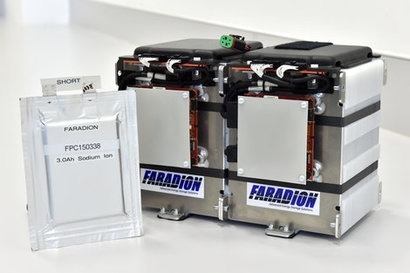
Sodium-ion batteries could be around 30 percent cheaper to produce than conventional lithium-ion cells, due to highly abundant sodium salts. This in turn could dramatically reduce the cost of electric vehicles (EVs). The project is part of Innovate UK’s £38.2 million initiative to make the UK a global leader in emissions-cutting technology. It could see sodium-ion batteries powering production electric cars as early as 2025.
Faradion and AGM will develop the technology to meet vehicle manufacturer specifications, delivering a working prototype for EVs by 2018. This will then be tested by a number of original equipment manufacturers (OEMs), also involved in Innovate UK projects, in order to develop EV powertrains. The programme will involve the partners modifying existing sodium-ion technology to make it suitable for use in EVs, including the adaptation of active materials at the cathode and anode to meet OEM specifications.
“This project will help the automotive industry to develop a more stable, sustainable and cost-effective solution to electric vehicle power than is currently available” said Faradion CEO Francis Massin. “Faradion’s leading role in this is demonstrates its position as the driving force in the development of sodium-ion battery technology.”
Kevin Brundish, CEO of AGM Batteries, added that the company is delighted to work with Faradion on the project and that it is uniquely positioned to take sodium-ion technologies to market. In addition to the automotive industry, a low-cost and safe battery technology has wide-ranging opportunities, including grid storage and oil and gas applications.
The project will receive significant financial backing from Finance Yorkshire, in addition to nearly £400,000 of Innovate UK funding. Faradion was one of the first investments made by Finance Yorkshire, allowing the company to develop its sodium-ion technology for a number of real-world applications.
Faradion is already working with UK-based cell developer and manufacturer, AGM Batteries to commercialise sodium-ion technology for high-volume manufacture at its 4,000 square metre production facility in Caithness, Scotland. AGM has been awarded £700,000 from Innovate UK to help develop the technology and produce first prototypes while Faradion recently announced it had received Innovate UK funding to develop the technology for solar energy storage in conjunction with Moixa Technology and WMG, University of Warwick.
For additional information:

